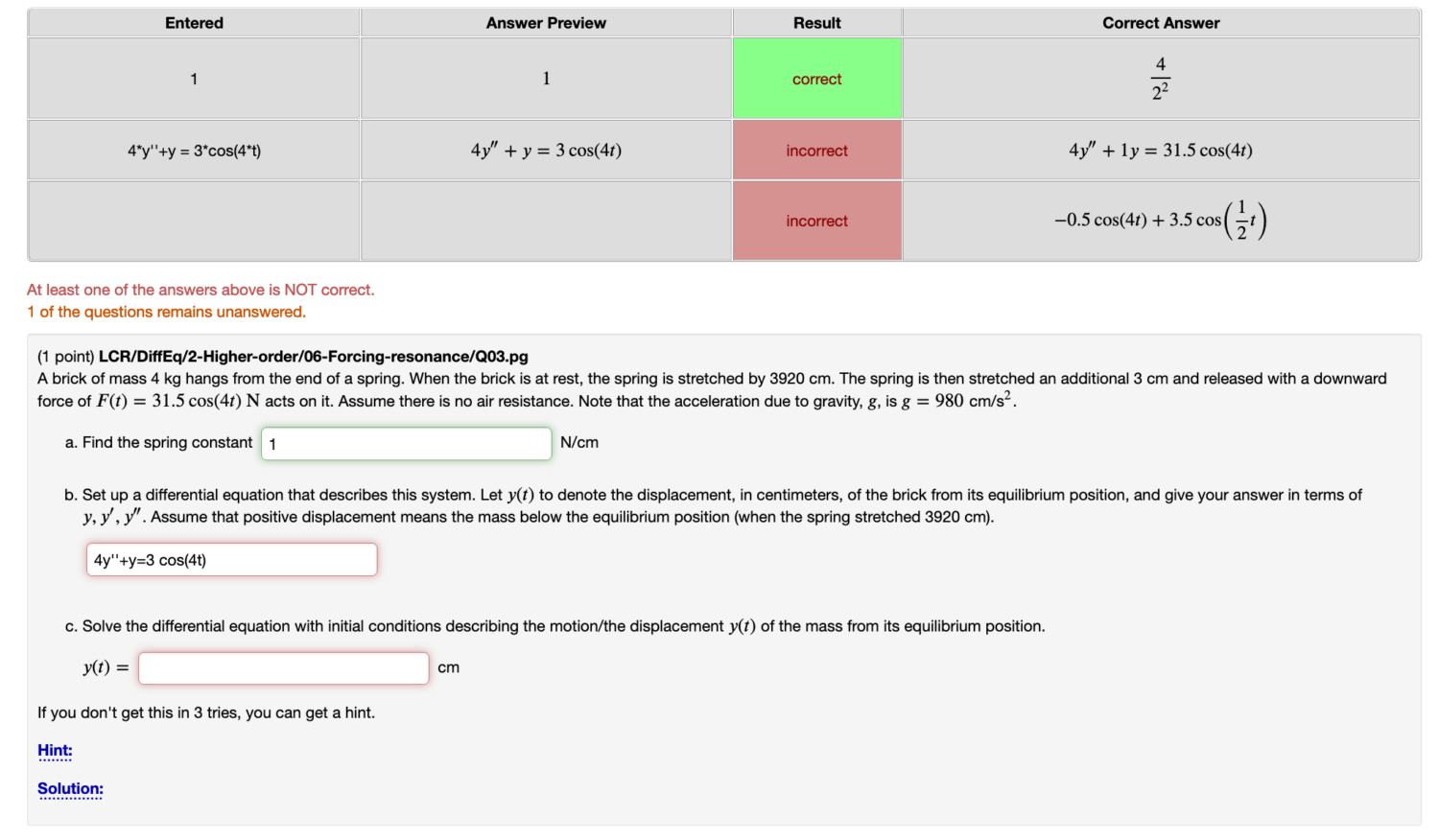WeBWorK Available to All Faculty

Did you know that DELTA now hosts WeBWorK at the enterprise level? The program is an open-source online homework system generally used for math, sciences and engineering courses.
What makes WeBWorK unique is its ability to generate new technical questions specific to each student. Faculty members create formulaic problems in WeBWorK. The homework system then fills in new variables each time the question is opened, and students figure out the answer. Faculty may want certain ranges, but instead of a problem in a book, where everyone is working with the same numbers, randomization is a real advantage.
Problems or problem sets may be created using a programming language such as Perl or Python. An instructor can make the problems really complex or relatively simple to ensure students are grasping the concepts.
Faculty can use open libraries of WeBWork problems developed by other instructors for a wide variety of subjects. For students, it is a way to complete homework problems without paying to use the system, as opposed to other popular platforms which charge for access.
WeBWorK Started Gaining Users at NC State
The Department of Mathematics began using WeBWorK on their own server years ago. Other faculty caught wind of the homework system, and instructors in the Physics and Engineering departments shared an interest in using the system as well.
Teaching Professor Alina Duca, who serves as director of undergraduate programs in Mathematics, reached out to the WeBWorK developers in 2010. At that time, they were offering free hosting on their server.
Duca recalls she “used WeBWorK for a couple of years on their server. Then I was able to convince our department to install WeBWorK on our server as part of a grant I had with my colleague Hatice Ozturck in the Electrical and Computer Engineering (ECE)/ Biomedical Engineering (BME) department. This was a grant to improve/refresh the mathematical preparation of our engineering students after they complete their math courses. WeBWorK was a vital tool that allowed us to create just-in-time modules.”
“I am currently using WebWorK for Differential Equations and Linear Algebra courses. I have colleagues who used it for graduate-level courses. I personally consider it to be a wonderful teaching tool, and I am happy that our students do not have to pay for it. The students receive instant feedback about their work, the problems can have a high level of mathematical sophistication, and the randomization encourages students to work collaboratively but still take responsibility for their own work” adds Duca.

Professor Emeritus Joel Trussell in ECE reached out to Duca in 2013, and she quickly added him to the project team.
After integrating WeBWorK into his own ECE courses, Trussell pioneered the adoption of WeBWorK in the ECE department, and began using the tool in his ECE 220 class in the fall of 2013. He led the effort to create problems for 10 other ECE classes since then and has written two papers describing their efforts. He found the student liked the instant feedback, which allowed them to correct errors on their own. They also used WeBWork’s capability to generate practice problems that can be used to prepare for tests.
Teaching Professor Greg Bottomley in Electrical and Computer Engineering has experience using WeBWorK as part of homework assignments in ECE 514.
“We use it primarily for homework problems whose final answer is a number or an equation. The tool provides a form of automated grading, which is useful when a learning outcome can be assessed primarily by the final answer. The tool also provides automated posting of the full solution that the instructor enters, allowing the student to check that they got the answer right in the right way,” he says.
Bottomly adds, “With large class sizes, such a tool saves grading time, allowing teaching assistants to spend more time in office hours providing one-on-one help in understanding course concepts.”
DELTA Adds WeBWorK to WolfWare Enterprise Tools
In April 2019 when DELTA got involved in discussions, there were 47 unique courses a semester using WeBWorK. These used WeBWorK for their homework, quizzes and optional tests.
Opening the system to more users was taxing the Department of Mathematics’ server. And with more faculty wanting access, it became more difficult to provide resources. It was available via plugins for Moodle, but the plugins became unsupported.

Assistant Director for Apps Dev Steve Bader recalls back in December 2019, DELTA began talking about running WeBWorK for the university. “It seems beneficial for everybody because we could put it in a place that allowed us to keep it stable and offer it to everyone. We can also put in place that we can connect it to Moodle simply and manage that connection,” he adds.
“After surveillance of the system and troubleshooting, DELTA determined the solution was to move to a Learning Tools Interoperability (LTI) connection, which is much simpler,” says Bader. LTI is a way to connect learning tools across systems.
“This solution would relieve some of the miscommunication the plugin was having.” He adds, “Connecting WeBWorK with an LTI connection allows us to remove that old plugin but maintain connections with the server.”
According to Bader, DELTA has a dozen or more LTI connections that they make to link, engage and add other tools.
“Our goal was to host WeBWorK the way it’s always been hosted. We didn’t lose any functionality in the transition,” says Bader.
The interface remains about the same as it was when hosted by the Department of Mathematics. In the future, DELTA staff want to work to improve accessibility.
Although WeBWorK didn’t change much, the way you log in did. Now you can use WolfWare, which holds all of NC State’s enterprise tools. Faculty have to migrate their content into the new course, set it up with their questions, and then it is ready.
DELTA piloted taking over WeBWorK as an enterprise tool for fall 2020. Now, any faculty member can use it if they activate it for their course in WolfWare. It is not available on the Projects server.
Since offering the service, DELTA’s PHP developers were able to tweak some code, changing protocol to retain information each semester on the server. When faculty using WeBWorK get a new course, data is retained from the previous semester.
Beginning this summer, faculty will have the option to create a WeBWorK course and automatically add the instructor and students to the course. Bader adds, “Just like Moodle, if you push the button, you’ll get a link and be all set.”
For support, users may contact LearnTech to troubleshoot from the WeBWorK forum.


